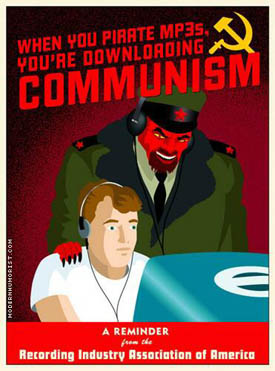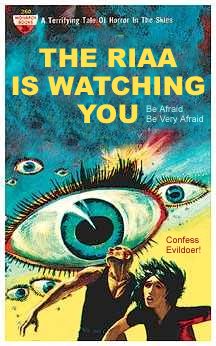RIAA Legal Ruling Could Shut Down The InternetU.S. government supports legal case that would criminalize making any files available on the world wide webBy Paul Joseph Watson Prison Planet Nov. 30, 2006 |
Popular 
Trump Confronts South African President on White Genocide

Trump, After Rearming Israel, 'Frustrated' With Netanyahu for Expanding War

CNN: U.S. Officials Say Israel Preparing Possible Strike on Iran

Israeli PM Netanyahu: Trump Told Me 'I Have Absolute Commitment to You'

U.S. Official Denies Report Trump Team Told Israel 'We Will Abandon You' If You Don't End Gaza War
  A landmark legal case on behalf of the Recording Industry Association of America and other global trade organizations seeks to criminalize all Internet file sharing of any kind as copyright infringement, effectively shutting down the world wide web - and their argument is supported by the U.S. government. A landmark legal case on behalf of the Recording Industry Association of America and other global trade organizations seeks to criminalize all Internet file sharing of any kind as copyright infringement, effectively shutting down the world wide web - and their argument is supported by the U.S. government.Ray Beckerman, a lawyer representing clients in cases against the RIAA, recently took part in a conference call organized by DefectiveByDesign.org, an organization which opposes DRM Technology, content restricting programs embedded into software that blocks users access to music, movies, software and other forms of digital data. Beckerman describes how Internet users are randomly targeted by the RIAA for simply having a folder of music on their computer, kept in the dark about legal details and intimidated into paying thousands of dollars immediately or facing a federal lawsuit. The RIAA doesn't even attempt to prove copyright infringement with specific examples, dates or times - it simply coerces and threatens the victim until they relent into paying out huge settlement fees. "They have an investigator pretend to be a user of KAZAA or one of the other similar file-sharing networks. He finds a shared files folder that has a goodly number of copyrighted songs in it. He has no idea whether those song files were obtained legally, whether though payed downloads, or through making personal copies from one's own CD for backup purposes, or whether anything illegal was ever done with those files, whether anyone ever copied one. And what he does: he takes a screen shot of this shared files folders (He of course does not see the folders, he merely sees the text in the metadata) and decides that this is a big shared file folder."  "Then through some secret process which he will not share with us and has tried to conceal from the courts, he then associates it with a dynamic ip address. And then, after he has what he believes is the correct dynamic ip address, for the date and time at which he made that screen shot, he then brings a proceeding to get the name and address of the subscriber who paid for the internet access, which of course would tell us nothing. But once he gets that information he then sues the person." "Then through some secret process which he will not share with us and has tried to conceal from the courts, he then associates it with a dynamic ip address. And then, after he has what he believes is the correct dynamic ip address, for the date and time at which he made that screen shot, he then brings a proceeding to get the name and address of the subscriber who paid for the internet access, which of course would tell us nothing. But once he gets that information he then sues the person."In one case, UMG vs. Lindor, a cleaner who has never used or owned a computer but simply dusted near one was sued as an online distributor in peer to peer file sharing. Accusing the RIAA of "conducting a reign of terror" by bringing lawsuits against defenseless people, Beckerman warned that one case in particular, Elektra vs. Barker, has the potential to shut down the Internet completely. RIAA's argument is that Miss Barker, a poor nursing student who lives in housing projects, should be prosecuted on the basis that "merely making files available on the internet is in and of itself a copyright infringement." Beckerman calls the complaint "a shocking argument because if it were accepted it would probably shut down the entire internet." One of the UK's biggest technology news websites, the Inquirer also today highlights the frightening development in an article entitled, RIAA wants the Internet shut down. The U.S. government has also filed legal briefs supporting the RIAA's argument. Deep sixing the entire Internet seems a highly unlikely move in that it would probably derail the world economy and put thousands of huge transnational corporations out of business. An outcome more likely to happen if this ruling is accepted is that it would further pave the way for government regulation and tracking of the Internet, namely "Internet 2," a completely controlled, surveilled and autocratic cyber police state similar to the Chinese model, whereby website owners have to obtain government permission to run a blog, be approved by a biometric thumb scan just to turn their computer on, and immediately get their Internet access shut off if they misbehave. This case is another attack arm of forces in government and the corporate structure that seek to suffocate the last outpost of true freedom of speech and dissent and it must be countered at all costs. |



